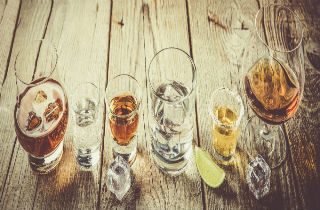Whether you want to know how to minimize drinking alcohol, suspect you are addicted to alcohol – how to stop, or if you’re just curious about the science of it, here we review the molecular basis for intoxication. And we invite your questions on how alcohol can make you drunk at the end.
Why does alcohol make me drunk?
How and why does alcohol make you drunk? It’s basically a chemical process. Alcohol gets you drunk by altering the body’s molecules immediately when ingested. Alcohol is made up of atoms or molecules. The only one that makes you drunk is ethanol. Ethanol contains special properties or molecules that change the atoms inside your body. So in its most simple explanation, alcohol gets you drunk because when you drink too much, the ethanol crosses the blood-brain barrier and affects the central nervous system. Alcohol stays in your body and is metabolized at a rate of 0.25 ounces per hour. So when you drink more than your body can metabolize, intoxication occurs.
What does ethanol do to the body?
Ethanol is a small molecule compared to the atoms in the body. The ethanol molecule is smaller than the atom it attaches to. So it is very easy for the ethanol to flow freely without any restrictions in the body. Plus, the ethanol molecule is water solvable. This makes it possible for the body to soak up ethanol or alcohol through the skin. This is why ethanol can soak through the outside of your body in a similar way that it affects inside.
Let’s take an example: most mouthwash has alcohol in it. As you are swishing moutwash around in your mouth ,the alcohol penetrates the skin in your mouth without you even swallowing. So alcohol got into your body through the tissue in your mouth. That’s really crazy when you think about it.
The metabolism (breakdown) of ethanol in the body
Alcohol is extremely effective as a toxin. There are many ways the body tries to get rid of the alcohol and ethanol ASAP. One way the body gets alcohol or ethanol out fast is by urinating. But when someone drinks excessively, the body can’t keep up with the amount of alcohol consumed. So no matter how much they hit the bathroom, their blood alcohol level gets higher and higher getting them drunk.
Another way the body gets rid of alcohol is through the pores in the skin. After a hard night of drinking, the body is processing ethanol so fast that it can startsto come out of the skin. That’s why someone can reek of alcohol without you having to even smell their breath.
The body gets rid of other toxins through the skin as well. Grease and oil in fast foods are toxic to the body. The body knows greasy foods are bad for it. So the body processes it as fast as it can. One of the ways the body excretes the oils is through your skin as well.
Is alcohol dangerous to the body?
It depends on how much you drink. When taken in large amounts, or chronically over time, alcohol can begin to affect the organs of the body. And keep in mind that alcohol causes more unnecessary deaths and trauma in the United States than all other illegal drugs combined. In comparison with big tobacco, big alcohol companies are not any different in terms of concern for your health. Tobacco is an addictive drug, as is alcohol. Their number one goal is to make money. I hope this information changes the public’s perception of alcohol in general and realizes how dangerous it really is.
How alcohol makes you drunk questions
Still have questions about how alcohol works? Please leave your questions here. We do our best to answer each question personally and promptly.









Related Posts